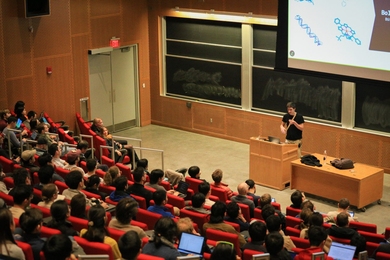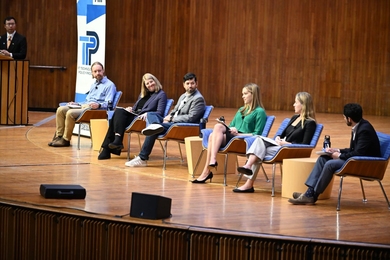About 50 students and several faculty and staff came up with a variety of constructive suggestions on how to address cheating at MIT in a meeting last week of the Undergraduate Association Council.
Topics of particular interest to the group included improving communication between professors and students, whether to establish an honor code or system, and making course "bibles," or packets of past tests and problem sets, available to all students.
The two-hour meeting was important because it helped define issues to be addressed at an Institute-wide colloquium on cheating planned for this fall.
In beginning the discussion, Professor Travis Merritt, associate dean for student affairs and one of three faculty guests at the UAC meeting, reminded the group that the issue of academic honesty has been around for some time. In 1984 a task force created to explore cheating resulted in a forum.
In recent years further incidents seem to warrant another look at cheating and how to prevent it. For example, Professor Nelson Kiang, chair of the Committee on Discipline and another faculty guest, noted the "monster case" of cheating in 1990 out of Course 1.00, Introduction to Computers and Engineering Problem Solving, where 80 students were charged with misconduct.
Improving the communication between faculty and students was a dominant theme of the discussion; participants agreed that doing so would significantly cut down on cheating. For example, most students don't let professors know if problem sets are too difficult, or the pace of a course is too fast. As Yev Gurevich, a representative from Next House explained, they feel ashamed or embarrassed.
As a result, some students start cheating. The situation gets worse, said Professor Kiang, when the professor says, "`Gee, the students are getting these questions quite easily,' so he cranks up the difficulty of the tests. This eventually leads to widespread cheating, until some students who cannot cheat under any circumstances finally complain." Professor Kiang believes that this is what happened in Course 1.00.
So how do you improve communication? One suggestion was to have student representatives from each recitation section in a class meet regularly with the professor to let him or her know how the students as a whole saw the class. Professor Kiang responded enthusiastically. "That one little change would do more than anything else to get feedback to the professor throughout the course."
He explained that "if the individual complains, the professor might think that this is just not a good student." But if a group of students complain, the professor would know that his or her expectations are unrealistic.
A few students, however, noted that there are student representatives for some courses, such as Course 5.11, Principles of Chemical Science, but they don't always come to the weekly meetings with the professor. In addition, Professor Merritt mentioned that it might be difficult for a student representative to get a consensus on what everyone else in his or her section feels.
Many believed that faculty guidelines on collaboration and cheating are important aids toward improving communication. Professor Arthur Smith, dean for student affairs and another faculty guest at the meeting, noted that when he surveyed the faculty on whether or not they provide such guidelines, more than half, or about 300, responded. And over 180 of those told him they don't write anything. One reason for this, agreed Professors Smith, Kiang and Merritt, is that such guidelines are very hard to write unambiguously.
Greg Lubinieck, a representative from New House, asked whether there was some way to "hound" professors into providing guidelines. The faculty guests disagreed with hounding, but Professor Smith said that he intends to "write and publish a default position [on cheating] every faculty member will have to buy unless he or she writes their own." The position "will be policy for any course that doesn't have its own [set of guidelines]."
The establishment of an honor code or system was another major issue discussed at the meeting. Professor Kiang told the group that the Committee on Discipline had voted unanimously that MIT should have an honor committee, or group of students to hear cases of academic dishonesty, sexual and racial harassment, and other problems. Such a committee, he said, could work through the COD.
"Students could complain to the honor committee, and if it was apparent that peer pressure and counseling were not effective for a certain student, the honor committee could go to the COD," Professor Kiang said. He stressed that the COD would be an important partner in any honor system.
The group also agreed that course "bibles" should be made available to all students, so those who live in living groups where they are readily available don't have an advantage over those who don't. "There ought to be a central repository for bibles," said Professor Merritt. He suggested that sets be kept at the libraries and eventually online, through Athena.
Professor Merritt noted that over this semester he hopes to develop a survey to "find out what we mean by saying that intellectual integrity is a problem here." However, he said, "we need help in putting together questions about the nature and extent of cheating at MIT, and the motives that lead to it." All suggestions are "solicited and welcome," he said.
Finally, Norma McGavern, director of UROP, reminded the group that they should think about academic dishonesty in the research laboratory as well as in the classroom.
A version of this article appeared in the February 26, 1992 issue of MIT Tech Talk (Volume 36, Number 21).





